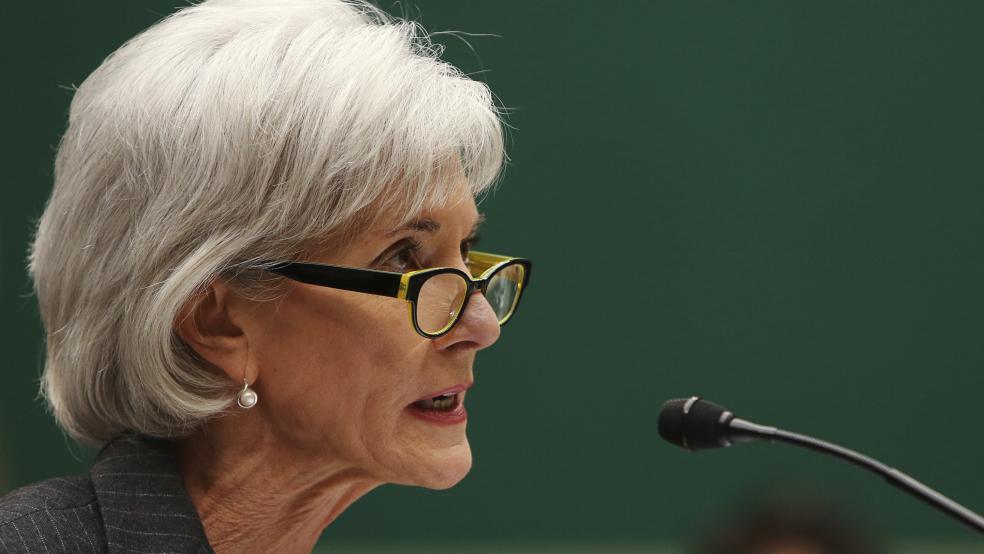If congressional hearings were like baseball games, the Republicans on the House Energy and Commerce Committee would have struck out swinging during their questioning of Secretary of Health and Human Services Kathleen Sebelius in Tuesday’s hearing on Obamacare implementation.
Rep. Joseph Pitts (R-PA) opened the questioning by complaining that while President Obama had once promised that average Americans’ insurance premiums would go down under Obamacare, some people were seeing premiums go up.
Related: Healthcare.Gov: Better, but Not Ready for Prime Time
Sebelius seemed in a forgiving mood in the early stage of the hearing – and as a result, she failed to define the term “average” for the congressman. Strike one.
Another questioner insinuated that Sebelius was being hypocritical by not buying her own health insurance through the exchange. Sebelius reminded him that, since she’s a 65-year-old woman eligible for Medicare, it would be illegal for an insurance company to offer her a policy through the exchange in the first place. Strike two.
Rep. Michael C. Burgess (R-TX) became agitated when he described how the health care exchange site had refused to accept his premium payment when he registered. “Do you know how hard it is to actually pull out your billfold and make the payment?” he roared.
Plainly baffled, Sebelius explained that the exchange doesn’t process payments in the first place. Customers are billed by the insurance firm they sign up with. Strike three.
Sadly, with no umpire to call them out, committee Republicans were able to keep going in that vein for more than two full hours, with Burgess providing many of the lowlights.
Responding to a question from the Texan about a McKinsey Group assessment of the Healthcare.gov website made last summer, Sebelius noted that one of the consultants’ main concerns was the functioning and reliability of the system’s “hub.”
“They thought that would be where the large number of problems occurred,” she said. “We focused a lot of time and attention--”
“And may I submit that they were actually accurate in that assignment,” Burgess interrupted.
“The hub has worked beautifully from start to finish,” Sebelius corrected him.
Nonplussed, Burgess immediately moved on.
“You’ve testified this morning that people cannot actually make their payment now, when they go on Healthcare.gov.”
“No, that’s not accurate, sir,” Sebelius replied, recounting statements made earlier in the hearing. “I said a lot of people haven’t yet made their payment. The payment isn’t due.
Related: Mental Health Gets $100m Boost from Administration
It was then that Burgess told of his failed effort to pay his premium through the health care exchange.
“I was unable to make my payment on Healthcare.gov,” Burgess said. “I was told, you can’t make that payment.”
“You make it to an insurance company,” Sebelius explained. “You don’t pay the federal government.”
The night before the hearing, HHS released enrollment figures through the month of November indicating that 365,000 people had enrolled in health plans, more than doubling the figures from the month before, when the disastrous rollout prevented many users from obtaining even the most basic information from the exchanges.
When it was his turn to question Sebelius, Rep. John Shimkus of Illinois charged that the administration’s November figure was “fraudulent.” His complaint hinged on the definition of the word “enrolled.” Because the administration isn’t processing payments, and can’t prove that premiums have been paid, he said, then it isn’t fair to say that all 365,000 have really “enrolled.”
“Madame Secretary, when Amazon.com records a book sold, they record a book sold based upon someone who’s paid for it. Not what’s in their shopping cart and not what’s on their wish list,” Shimkus began.
“So our concern is that the 364,000 (sic) number is fraudulent because it is not those who have purchased plans yet. So I would ask that when you return, that you give us actually who has purchased plans. Do you understand our frustration with that?”
“Sir, as you well know, we did not take over the private insurance market,” Sebelius began. “People will purchase –“
Related: Obamacare Fixes Hide a Big Mess on the Back End
“But you are telling us that those who just shopped have enrolled,” Shimkus interrupted.
“I have told you, sir, who is enrolled—“ Sebelius said again, trying to answer.
“That’s why we’re frustrated,” Shimkus said, breaking in again. “Because we just don’t get the truth out of you.”
Moving to his next question, Shimkus continued to challenge Sebelius on semantics. He said that he had just taken a phone call from a Democratic state senator from Illinois who serves on an insurance oversight committee, who told him that mandated preventive services, such as those provided under the Affordable Care Act, increase premiums.
“So you cannot say, as you have numerous times, that these preventative care service are free of charge, can you?” he demanded.
“They are free to the consumer, yes sir,” Sebelius answered.
“They are not,” insisted a visibly angry Shimkus. “There is no free lunch, Madam Secretary.” Again citing the unnamed Illinois state senator, Shimkus insisted that requiring preventive care at no additional cost results in raised premiums.
“Again,” said Sebelius, “consumers will not have a co-pay or deductible –“
“Will you admit they will have a higher premium?” Shimkus broke in.
“No, I do not,” Sebelius replied. “I think what a lot of actuaries will tell you is that if you have preventive care and prevent a more costly hospital stay--”
“All right, I got it,” Shimkus said, interrupting again. “We’re just going to agree to disagree. It’s like talking to the Republic of Korea or something.
Presumably, he meant North Korea – where one suspects the questioning of witnesses has a similar tone to what occurred today. - Follow Rob Garver on Twitter: @rrgarver
Top Reads from The Fiscal Times:





